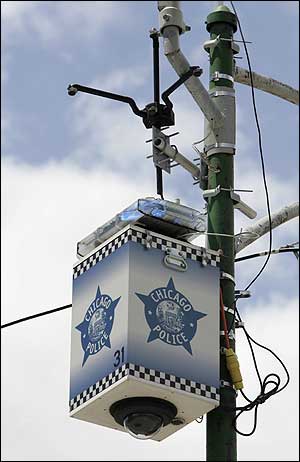Big Brother? No.
City officials [in Chicago] are using new technology that recognizes the sound of a gunshot within a two-block radius, pinpoints the source, turns a surveillance camera toward the shooter and places a 911 call. Officials can then track the shooter and dispatch officers to the scene. . .
After a successful pilot program, Chicago officials have installed 30 of the devices alongside video surveillance cameras in high-crime neighborhoods, with 12 more on the way, and dozens more to follow, Baker said.
The system's formal name is Smart Sensor Enabled Neural Threat Recognition and Identification or SENTRI. And the technology is not just gaining favor in Chicago.
In Los Angeles County, the sheriff's department plans to deploy 20 units in a pilot test, and officials in Tijuana, Mexico, recently bought 353 units, Baker said. Police in Philadelphia and San Francisco are close to launching test programs of their own, and New Orleans and Atlanta have also made inquiries. . .
The American Civil Liberties Union in Illinois said it is somewhat concerned about privacy rights being violated because the city's camera system is so prevalent. . .
Adding the SENTRI to an existing surveillance camera is not cheap. The system costs between $4,000 and $10,000 per unit, but in Chicago they and the accompanying cameras are paid for with forfeiture money.
Link.

All right, perhaps it's a little Orwellian, but these machines are far (far) removed from what Orwell described in his famous novel:
It was terribly dangerous to let your thoughts wander when you were in any public place or within range of a telescreen. The smallest thing could give you away. A nervous tic, an unconscious look of anxiety, a habit of muttering to yourself–anything that carried with it the suggestion of abnormality, of having something to hide. In any case, to wear an improper expression on your face”¦ was itself a punishable offense. There was even a word for it in Newspeak: facecrime”¦ 1984
Is there a slippery slope here? Perhaps, but there's slippery slope potential with every law. Do we impose speed limits on cars? If 70 mph saves lives, 55 mph would be better. How about making it 35 mph? Every law requires an exercise in prudence. Here, we're dealing with cameras in public places designed to detect criminal activity. And they appear to be reducing crime in dangerous areas. Before anyone condemns the cameras, he should go live in one of those areas first.
